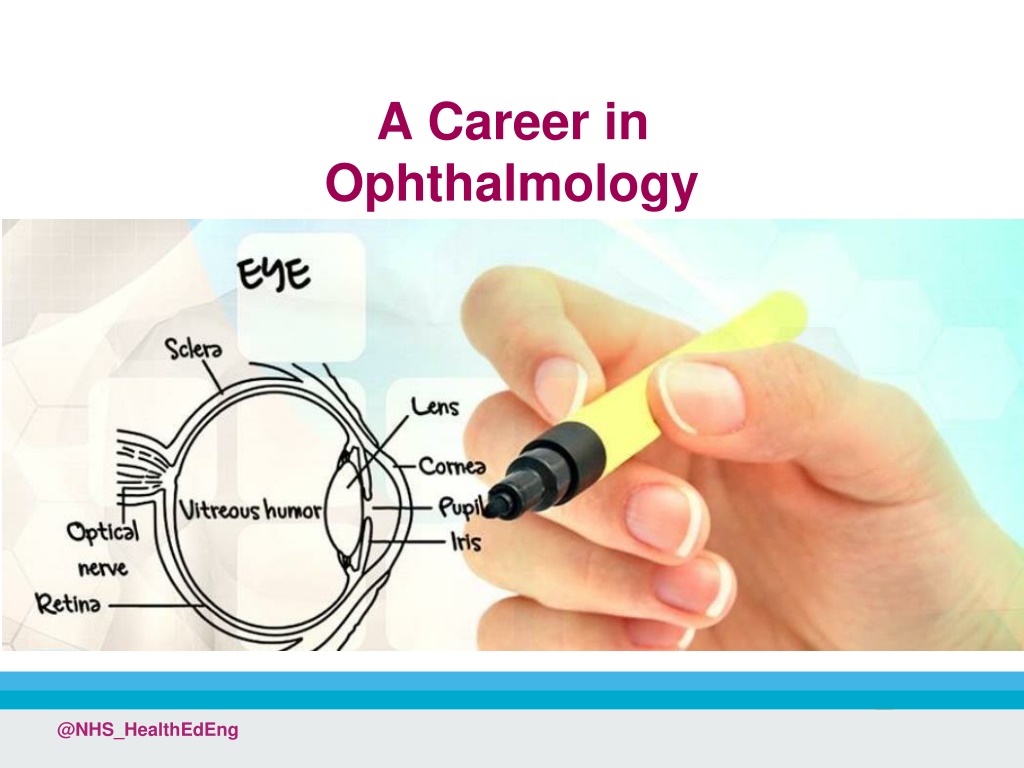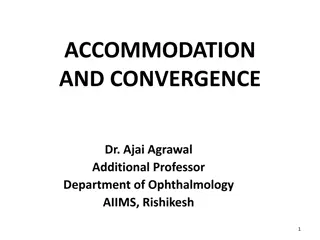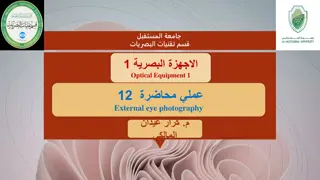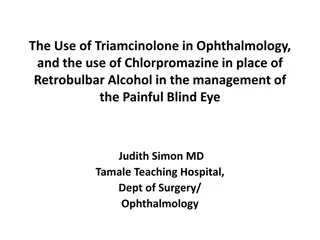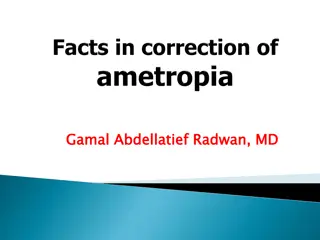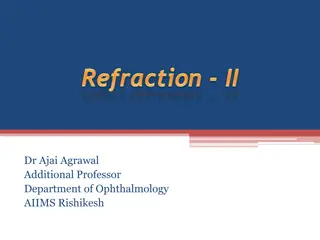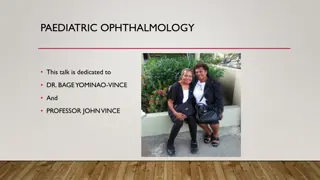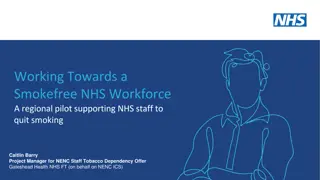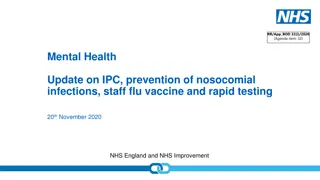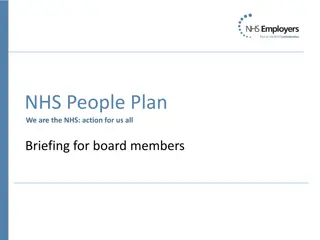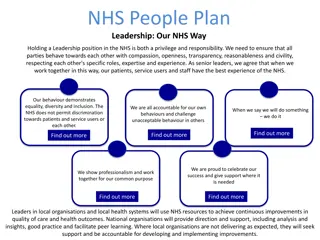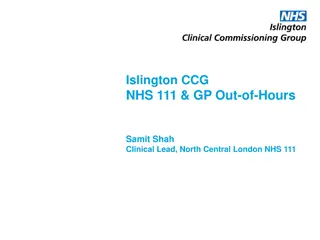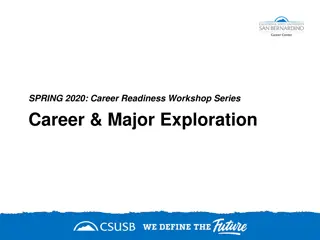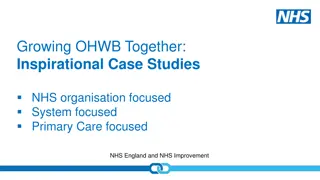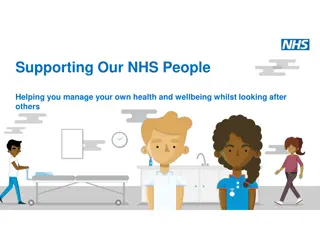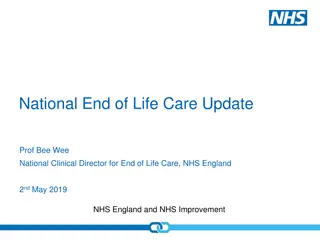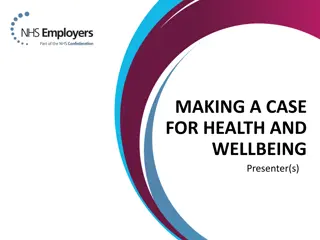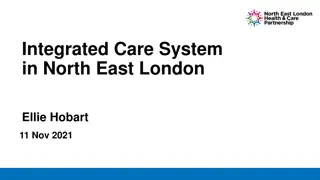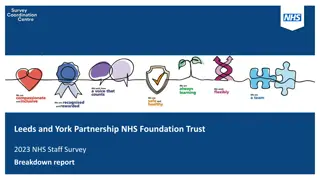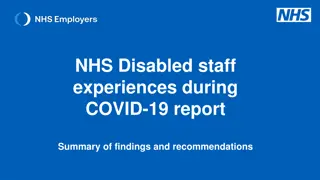Exploring a Career in Ophthalmology at NHS
Ophthalmology is a specialized branch of medicine focusing on the diagnosis, treatment, and prevention of eye and visual system diseases. Ophthalmologists are highly skilled doctors with over 7 years of training, managing a range of conditions and collaborating with various specialists. They perform clinical procedures, specialized surgeries, and treat eye conditions in premature babies. Ophthalmologists can specialize in various subspecialty areas beyond cataract surgery, offering a diverse range of treatments and services.
Download Presentation

Please find below an Image/Link to download the presentation.
The content on the website is provided AS IS for your information and personal use only. It may not be sold, licensed, or shared on other websites without obtaining consent from the author. Download presentation by click this link. If you encounter any issues during the download, it is possible that the publisher has removed the file from their server.
E N D
Presentation Transcript
A Career in Ophthalmology @NHS_HealthEdEng
Contents Ophthalmology Overview Advantages / Disadvantages Career Pathway Competition ratios Commitment to Specialty Further Information (Please click on topic for direct link) @NHS_HealthEdEng
What is Ophthalmology? Ophthalmology is a branch of medicine dealing with the diagnosis, treatment, and prevention of diseases of the eye and visual system. @NHS_HealthEdEng
Ophthalmologists Highly skilled doctors with > 7yrs of postgraduate training Both physician and surgeon Manage a wide range of conditions including cataract, glaucoma macular degeneration, squint, eyelid, corneal and retinal pathology o Diseases of the eye may be part of an underlying systemic disease such as diabetes mellitus o Close collaboration with many other specialists including diabetologists, rheumatologists, neurologists, neurosurgeons, ENT & maxillofacial surgeons, plastic surgeons, paediatricians and geneticists @NHS_HealthEdEng
Ophthalmologists Multi skilled in clinical procedures including laser treatment, outpatient interventions, minor oculoplastic procedures and a vast array of specialised ophthalmic operations Did you know that Ophthalmologists also examine and treat eye conditions in premature babies? @NHS_HealthEdEng
Not Just Cataract Surgery! Ophthalmologists usually specialise in one or more subspecialty areas Neuro-ophthalmology Ocular Oncology Oculoplastics Orbital/lacrimal disorders Paediatric Ophthalmology Strabismus Vitreoretinal surgery Cataract & Refractive Surgery Cornea & External Diseases Glaucoma Inflammatory Eye Disease, Uveitis & Scleritis Medical Ophthalmology Medical Retina @NHS_HealthEdEng
Equipment We Use @NHS_HealthEdEng
Ophthalmic Treatments Most ophthalmologists have 2 operating sessions a week Undertake procedures using different types of laser or surgery, mostly performed under local anaesthesia and as a day case Ophthalmic surgery includes: o Cataract surgery o Squint and glaucoma surgery o Oculoplastic surgery o Intraocular injections for macular degeneration o Retinal surgery o Laser treatments @NHS_HealthEdEng
Ophthalmic Treatments Cataract surgery is the most common operation in the NHS Did you know that in England over 300,000 cataract operations are performed every year under the NHS using a small incision (key hole) surgery known as phacoemulsification @NHS_HealthEdEng
Eye Emergencies Daytime and on-call duties involve managing numerous eye emergencies that present everyday. o Most hospitals have their own EyeA& E (or urgent care clinics) Presentations vary from a simple corneal foreign body, chemical burns, angle-closure glaucoma, retinal vascular disorders, retinal detachments and eye trauma. o Even patients with brain tumours may first present to an eye casualty department Consultant Ophthalmologists take part in an on-call rota but night work is unusual. @NHS_HealthEdEng
Why did you choose to be an Ophthalmologist? I became an ophthalmologist because it allowed me to blend medicine and surgery in a highly technical environment and in a discipline that is evolving I wanted the challenge of learning new skills and knowledge, and the satisfaction of highly effective treatments Lower levels of night work, good career prospects and no requirement to initially train in general surgery were also factors in choosing this speciality @NHS_HealthEdEng
Typical Day 08:30 Review of ward in-patients 09:00 Medical Retina clinic - You see a young patient with advanced diabetic retinopathy, and arrange urgent laser treatment and intraocular injections to prevent the risk of blindness. The patient is grateful for saving her eyesight. 13:00 Pre op ward round for afternoon theatre list 13:30 Theatre - You operate on Mrs B s right eye. She has dense cataract in both eyes and has been struggling to look after her grandchildren. Surgery is uncomplicated and Mrs B goes home a short while later. Next day, you get a message from Mrs B saying that she is overjoyed with her vision and she can see her grandchildren clearly for the first time in a number of years. 17:00 On call @NHS_HealthEdEng
Do ophthalmologists work in a team? Other health professionals play an important role in the care of ophthalmic patients, and teamwork is essential to ophthalmic practice. Hospital Doctors and GP s Ophthalmic Nurses Orthoptists o Assess problems relating to eye movements and binocular vision Optometrists o Prescribe and dispense spectacles and contact lenses Electrophysiologists o Provide electrodiagnostic and monitoring services for patents with inherited retinal diseases or visual pathway disorders @NHS_HealthEdEng
Do ophthalmologists work in a team? Visual Function Technicians o Carry out a number of investigations including visual field tests, B-scan ultrasound, optical coherence tomography and tomographic imaging of the optic nerve Ocular Prosthetists o Responsible for the supply & fitting of ocular and oculofacial prosthesis Ophthalmic Photographers o Photographic (including angiographic) and video techniques are essential in the diagnosis and monitoring of many ophthalmic disorders @NHS_HealthEdEng
Advantages & Disadvantages Rewarding career: quick and substantial difference to patient s quality of life Mix of medical and surgical Many areas to sub-specialise Run through training Work as part of a larger team Good work / life balance Quiet night on-calls Private Practice Can be long busy days Competitive Increasing demand for services with stretched resources Some Independent eye departments means working in isolation @NHS_HealthEdEng
Career Pathway Following two years foundation year training, doctors can apply for competitive run-through training in ophthalmology. National Recruitment at ST1 level Selection process includes portfolio assessment, interviews / assessments at multiple stations Usually about 90 training posts per year across the UK 7 year run-through training which is competency-based and leads to a Certificate of Completion of Training (CCT) @NHS_HealthEdEng
Career Pathway Phases of training : Basic level o ST1-2 (two years) Intermediate level o ST3-4 (two years) Higher level o ST5-6 (two years) Advanced level o ST7 (one year in an area of subspecialty interest) @NHS_HealthEdEng
Career Pathway Academic Ophthalmologists: Aclinical academic pathway established through the National Institute for Health Research (NIHR): o Academic clinical Fellowships (ACF) o Clinical Lecturerships (CL) ACFs are usually ST1-3 level and provide a clinical and academic training environment to prepare an application for a training fellowship leading to a PhD (or equivalent). CL s are aimed at trainees who are advanced in their specialty training, have completed a research doctorate or equivalent and show outstanding potential for continuing a career in academic medicine. @NHS_HealthEdEng
Examination Structure Part 1 FRCOphth o No previous experience in ophthalmology is required to sit Part 1 o Covers the learning outcomes of the first two years of training o Must Pass by end of the second year of training The Refraction certificate o Practical exam o Must Pass by the end of the third year of training Part 2 FRCOphth o Written Component - 180 single answer from 4, MCQ paper o Oral Component - Structured viva and clinical examination o Must be passed by Year 7 in Ophthalmic Specialist Training FinalAccreditation is achieved when all the competencies are achieved and the Part 2 FRCOphth is passed @NHS_HealthEdEng
Recruitment - Competition Ratio 2021 Competition Ratios @NHS_HealthEdEng
Personal Qualities Person Specification @NHS_HealthEdEng
Commitment to Specialty Taster week Prizes: e.g. Duke Elder Microsurgical Skills course Regional Events: o Midland Ophthalmological Society o Regional Postgraduate OphthalmologyTeaching Trainee Research Network National Ophthalmic Trainee Group Symposium Audit Research / publications Teaching Medical student SSA Logbook : Skills / procedures / interesting cases Part 1 FRCOphth @NHS_HealthEdEng
East Midlands Specific Ophthalmology If Ophthalmology is your passion, the East Midlands is a great place to train. Offering superb facilities, a popular and well-structured training programme and a range of academic opportunities you'll develop your career under the supervision of some nationally regarded experts. The East Midlands also offers a great work/life balance. With geographically convenient rotations, affordable house prices and superb transport links you'll be based in one of the UK's most vibrant and thriving regions. https://www.eastmidlandsdeanery.nhs.uk/surgery/ophthalmology @NHS_HealthEdEng
West Midlands Specific One of the largest regions in the country Training programme has posts in hospitals in: o Birmingham, Burton-on- Trent, o Coventry o Dudley o Hereford o Sandwell o Shrewsbury o Stoke-on-Trent o Wolverhampton Great chance to visit some of these cities and experience each regions attractions oIronbridge Gorge (UNESCO World Heritage Site) Birthplace of the industrial revolution oStaffordshire Potteries oBordering the peak district national park o5 areas of outstanding national Beauty oWye Valley oShropshire Hills oCannock Chase oMalvern Hills oParts of Cotswolds @NHS_HealthEdEng
Where to go for more information Royal College of Ophthalmologists o Training o Acareer in Ophthalmology National Ophthalmology Recruitment NHS health careers JRCPTB specialty page and curriculum ST3 Recruitment RCP (London), Specialty spotlight The day in the Life of an Ophthalmology Trainee @NHS_HealthEdEng
